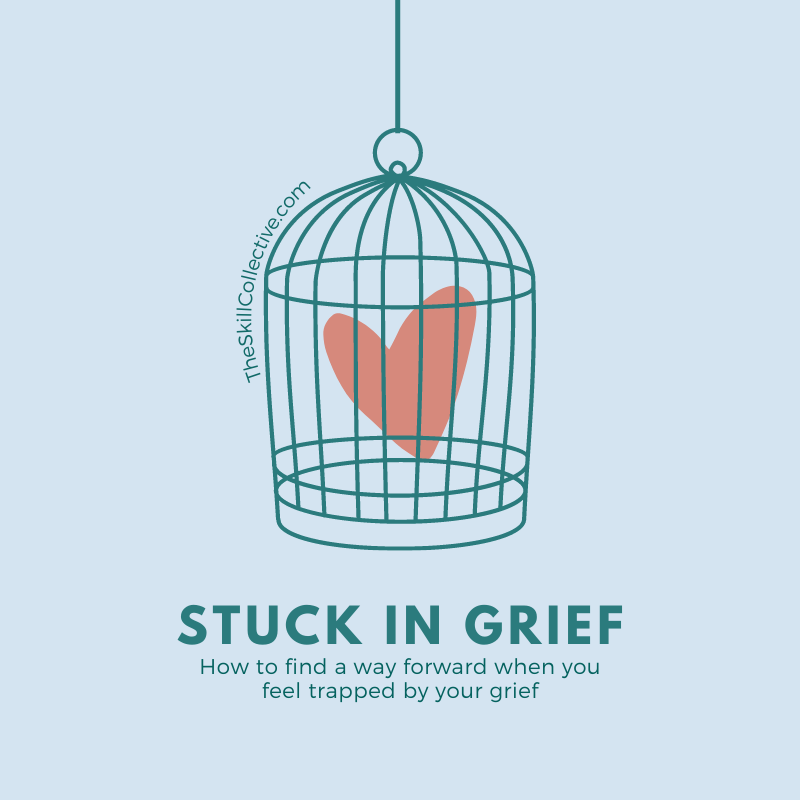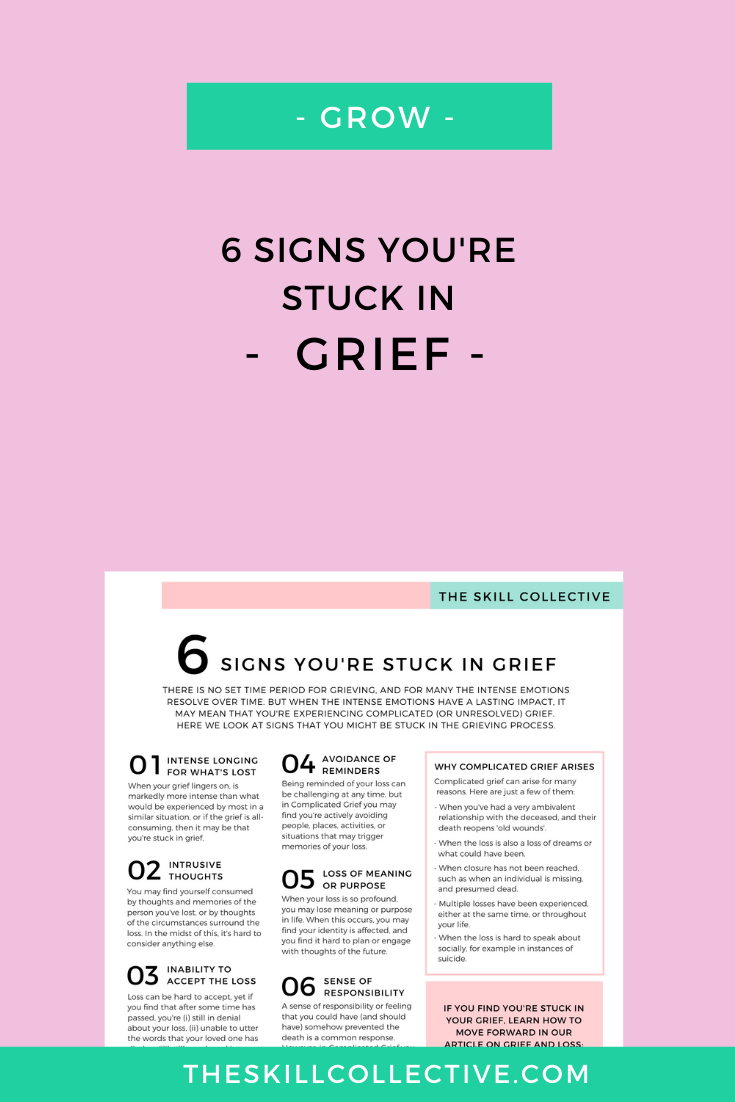Stuck in grief? What to do when you can’t move on.
By Cait Reddyhough
Loss is part of life and of the human experience. We experience loss in a variety of ways – from loss of a loved one, to a relationship ending, from the passing away of our pets, to the loss of pregnancy through miscarriage, stillborn, or the loss of fertility. We can also experience loss when jobs end, or a phase of our life ends. Indeed, loss is part of the circle of life, but grief – our reaction to loss – can look very different for different people.
In this article we’ll cover:
Why grief differs for different people
What are the signs of grief?
Is grief the same as depression?
Tips to help you move forward when you’re stuck in grief
WHY IS GRIEF DIFFERENT FOR DIFFERENT PEOPLE?
Everyone’s relationship to the loss is different, and therefore everyone’s grief experience is different. Someone may be struck with heavy grief at the loss of a pet that played a very significant part of their life, whereas others may not mourn the loss of an estranged parent.
The meaning of, and relationship to, what has been lost plays an important role in the grief reaction:
Losing a job may mean just the loss of work for some, but for others it can mean the loss of a close social network, a loss of routine, the loss of financial security, and the loss of an important part of their identity.
Retirement for some may represent freedom, but for others it may represent not just the loss of a cherished career, but also the loss of an important part of identity.
Losing a pet may not mean just the loss of a furry friend, but the loss of a constant companion who has been there through very difficult times.
The end of a relationship may, for some, be a sad and heavy loss and represent the loss of future dreams.
Receiving a significant health diagnosis for some can mean making positive lifestyle changes, but for others it can be a loss of quality of life and may also result in a loss of social connections.
As you can see, losing someone or something can mean different things to different people - loss of routine, loss of identity, loss of hopes and dreams, loss of quality of life and social connections. Naturally, the grief experience is different for different people and there is no right way to grieve. [1].
“Grief is like the ocean; it comes on waves ebbing and flowing. Sometimes the water is calm, and sometimes it is overwhelming.
All we can do is learn to swim.”
WHAT ARE THE SIGNS OF GRIEF?
While there is no ‘right’ way to experience grief, the following are common signs.
Experiencing changes to emotions
Grief may be accompanied by a range of emotional changes including sadness, guilt, anger, relief, joy, isolation, or even numbness, particularly if you had an ambivalent relationship with what was lost. It is also common to cycle through these different emotions at different times.
Problems with Sleep
Insomnia - where you find it hard to fall asleep, or stay asleep, is common in those going through a grief experience. Lying in bed feeling overwhelmed by emotion and memories can have a real impact on your sleep.
Hallucinations
Hearing the voice of a deceased loved one, or seeing their image is very common in grieving process, particularly in older adults who have lost a loved one. [2]
Changes to Thinking
It is common to experience preoccupation with thoughts, memories, or images of the loss throughout the experience of grief. This can make it hard to concentrate on other tasks at hand.
Changes in Intensity of grief
For many, the intensity of grief will fluctuate over time, increasing around significant moments such as birthdays and anniversaries, life events (e.g. weddings, graduations).
Is your grief experience ‘normal’, or are you stuck in grief?
All of the above grief experiences are ‘normal’, and will vary over time and around significant moments in life. However, if you find yourself unable to move forward with your life while honouring your loss, it may be that you’re stuck in grief. Our tip sheet highlights signs that you’re stuck in grief, and looks at causes of complicated grief.
IS GRIEF THE SAME AS DEPRESSION?
Grief and depression can look quite similar, and at times it can be difficult to tell them apart. Here are some key differences to look out for [3]:
Grief is about emptiness and loss, yet positive emotions and humour are still apparent from time to time. In contrast, depression is marked by depressed mood that colours much of life, and is accompanied by difficulties in anticipating pleasure or happiness.
Sadness in grief comes in waves, usually in response to reminders of the loss. The sadness you experience in grief tends to gradually ease as time passes from the loss. In contrast, the low mood experienced in depression is more persistent, and tends not to be tied to specific reminders or thoughts.
Grief-related thoughts tend to centre on thoughts and memories of the loss, whereas thinking patterns in depression are more global and tend to focus on the self, world, and the future.
Low self-esteem, worthlessness, and self-loathing are common in depression, which reflects the more global impact that depression has on the individual. In contrast, self-esteem is largely not impacted in grief.
You can learn more about depression on our Depression webpage here.
TIPS TO HELP YOU COPE WITH GRIEF AND LOSS
If you recognise that you might be having difficulty with grief, it is important that you take some steps towards moving forward. Self-compassion involves showing compassion to yourself in instances of inadequacy, failure, or general suffering, and in the context of grief and loss it may look a bit like this [4]:
Respect your Loss. Find a meaningful way to pay respect to your loss. That might mean writing a letter to your lost one, journalling your experience or memories, planting a tree, or creating your own memorial space.
Prioritise Self-Care. Taking time for yourself is particularly important through periods of high stress. That includes looking after your physical health and limiting your reliance on addictive substances like alcohol, cigarettes, and other drugs.
Let your Mind be Kind. There are perhaps a lot of ‘should have’, ‘would have’ and ‘could have’ thoughts at this point in time, as you may reflect on what you could have done differently if you had your time again. It’s important to understand that hindsight changes our perspective on past events.
Reach Out. Grief and loss are a normal part of the human experience, so you are not alone in your experience. However, sometimes the grieving process can make it feel that way. Speaking to somebody (perhaps me!) about what you are going through can be an important step in processing your grief and re-engaging with life.
Above all, it’s important not to ignore your grief and push on as usual. The rituals around the loss (e.g. funeral, retirement party, divorce party) may have come and gone, but grief lingers on and ebbs and flows at different moments in your life.
REFERENCES
[1] Robinaugh, D. J., Marques, L., Bui, E., & Simon, N. M. (2012). Recognizing and treating complicated grief. Current Psychiatry, 11(8), 30-34.
[2] Badcock, J. C., Dehon, H., & Larøi, F. Hallucinations in Healthy Older Adults: An Overview of the Literature and Perspectives for Future Research. 10.3389/fpsyg.2017.01134
[3] American Psychiatric Association. (2013). Diagnostic and statistical manual of mental disorders (5th ed.). Washington: American Psychiatric Association.
[4] Zisook, S., Iglewicz, A., Avanzino, J., Maglione, J., Glorioso, D., Zetumer, S., Seay…, K., Vahia, I., Young, I., Loebowitz, B., Pies, R., Reynolds, C., Simon, N., & Shear, M.K. (2014). Bereavement: course, consequences, and care. Current psychiatry reports, 16(10), 482. doi: 10.1007/s11920-014-0482-8












We can enter a grieving process following the loss of someone who has been part of your daily life. Read on to learn more about the stages of relationship grief.